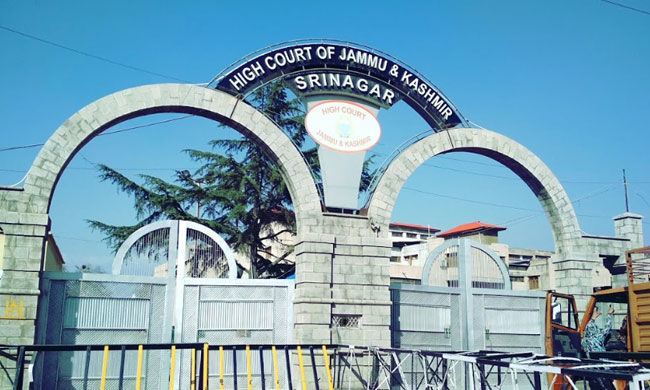Srinagar, Nov 1: The High Court of Jammu & Kashmir and Ladakh Monday ruled that the imposition of the punishment of dismissal after undergoing the earlier punishment for the same offence amounts to imposing two punishments which comes within the “mischief of double jeopardy.”
Setting aside a termination order against a constable, Mohammad Amin Wani, who was dismissed from the services for his alleged misconduct, the court observed that imposition of penalty of dismissal is “highly disproportionate and shocks the conscience of the court.”
While quashing the termination order issued by DIG, Central Reserve Police Force (CRPF) on June, 15, 2009, the court of Justice Wasim Sadiq Nargal observed that the same has been passed in contravention of the provisions of Clause (2) of Article 20 of the Constitution of India as the petitioner has been punished for the same offence twice which falls within the realm of double jeopardy.
The court said that the order passed by DIG CRPF is illegal and arbitrary because the same has been passed ignoring the provisions of Section 11(1) of CRPF Act 1949 as the petitioner has been charge sheeted in the aforesaid provisions and the disciplinary proceedings were initiated against him by resorting to the provisions which provides for minor penalty.
“But the respondent No. 4 (DIG CRPF) in flagrant violation of above said provision has imposed a major punishment of dismissal from service which is not sustainable in the eyes of law,” the court said.
The court noted that no valid reason has been recorded and the order does not disclose any such reasons muchless a legal, plausible and valid reason justifying the enhancement of punishment.
Even though, the bench underscored, the power to suo-moto revise the punishment including enhancement has to be considered by the Inspector General or DIG in terms of Rule 29(d) of the CRPF Rules 1955, however, such power by no stretch of imagination can be allowed to be exercised in an arbitrary manner as has been done in the present case.
“Such power in all fairness could be exercised before the sentence is awarded and executed and not after that,” the court said.
The court noted that the petitioner has already undergone the punishment inflicted pursuant to the detailed enquiry of 28 days confinement to Quarter Guard awarded by the Commandant 84th Battalion, who was the competent authority and the petitioner had already undergone the punishment and thereafter, the decision to impose the major penalty by way of dismissal cannot sustain the test of law.
Justice Nargal recorded that it is a rarest of rare case where on the basis of the enquiry report and based on circumstantial evidence, the petitioner was found guilty of indirect involvement in the incident and as a consequence of which the disciplinary authority has imposed punishment of 28 days confinement in Quarter Guard which the petitioner had underwent being a subordinate officer and did not chose to file any appeal.
After having undergone the aforesaid punishment for the alleged offence which was attributable to the petitioner, the concerned DIG without conducting any further enquiry or basis or following the principle of natural justice enhanced the punishment from 28 days to dismissal from service by resorting to the provisions of Rule 29 (d) of CRPF Rules.
The bench underscored that the rule of law prohibits the exercise of power in an arbitrary manner and/or in a manner that travels beyond the boundaries of reasonableness.
“Thus a statutory authority is not permitted to act whimsically/arbitrary and action of the statutory authority should be guided by the principles of reasonableness and fairness and the authority by no stretch of imagination can be permitted to abuse the law or to use it unfairly,” the court said.
The bench recorded that the statutory authority has exercised the power in an arbitrary manner which is shockingly disproportionate to the alleged misconduct of which there is no proof and that too after the petitioner has undergone the first punishment imposed by the disciplinary authority.
“He was held liable merely on the basis of circumstantial evidence and has also undergone a punishment for the same, therefore it is evident that the punishment of dismissal from service is disproportionate and the high court is justified in interfering with such punishment,” the court recorded.
Allowing the plea, the court directed the respondents to reinstate the petitioner and allow him to join the duties, as such.
The bench directed the respondents to release the withheld wages/salary of the petitioner for the period he remained out of service owing to the order dated 15th June 2009, if he is not gainfully employed elsewhere.
The respondents were further directed to release all consequential benefits in favour of the petitioner in consequence of his reinstatement in the respondent department.
“The order impugned dated 15th June 2009 by virtue of which the petitioner came to be dismissed from service cannot sustain the test of law and is hereby quashed/set-aside as the same is shockingly disproportionate to the misconduct,” the court said.
Imposition of two punishments for same offence amounts to ‘mischief of double jeopardy’: HC

Leave a Comment
Leave a Comment







